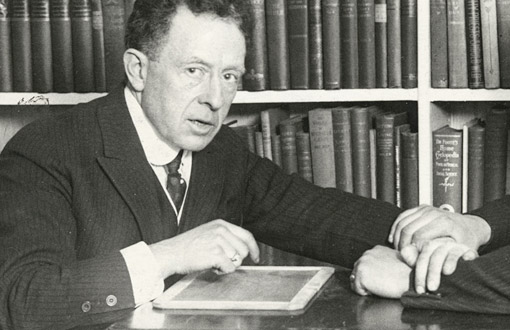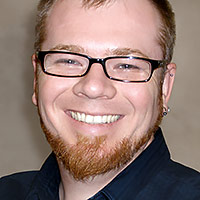
Skeptic Joseph Rinn, demonstrating mediumistic trickery for a press syndicate in 1920. (From Daniel Loxton’s collection.)
Scientific skepticism has a long history—roughly 40 years in its most modern organized form, and centuries (arguably millennia) as a more or less recognizable tradition. (See my “Why Is There a Skeptical Movement?” for a discussion of this lengthy intellectual thread—PDF.)
We’ve learned a lot in that time. Generations of skeptics have devoted themselves to understanding paranormal and pseudoscientific claims, beliefs, and impostures. But even with those efforts, the fringe has remained radically under-examinded. Because this realm is so vast while the scholars and activists interested in exploring it are so few, our work has often had something of a scrambling quality. In our rush, skeptics have tended to neglect, or at least to set aside for some future time, some of the improvements of better-established fields.
Academics take it for granted that the ever-evolving practice of medicine should be weighed and considered by an ancillary scholarly field of medical ethics. By contrast, ethical conversations in skepticism tend to be ad hoc afterthoughts (and frequently much contested). Many such reflective disciplines exist for other fields, from art history to the philosophy of science. There are academic journals dedicated not only to the history of science as a broad umbrella, but also specifically to the history of psychology, geology, medicine, astronomy, and so on. For our part, skeptics are left to preserve, study, and remember the lessons of our own history as best we can as we go along. With so many other urgent triage priorities, the truth is that we tend not to remember very well.
This forgetfulness seems sad to me on an existential level. I’d prefer that those who fought these battles before us, from Rose Mackenberg to Joseph Rinn, be honored for having having once stood as the man in the arena (as Teddy Roosevelt so memorably described those who spend themselves “in a worthy cause”1). But of course there are also practical benefits to the study of the work of the past.
Among those benefits is context. It’s easy for skeptics to fall prey to a sort of exceptionalism of the present. Skeptics sometimes feel that we live in a moment in which pseudoscience poses an unparalleled threat (perhaps a “rising tide of irrationality”) to be met with a uniquely new kind of science-based understanding of how thinking goes wrong. Astronomer and skeptic Carl Sagan had little patience for the paranoid (and for skeptics, oddly self-aggrandizing) idea that “there’s an explosion of ignorance today,” saying in 1994,
No, I think we’ve always been like that. We had demons from ancient Greece, gods who came down and mated with humans, incubi and succubi in the Middle Ages who sexually abused people while they were sleeping. We had fairies. And now we have aliens. To me, it all seems very similar.2
Taking up this topic again two years later, Sagan emphasized, “This is an endemic human characteristic—to be credulous, to believe what others tell us, to prefer what feels good to what’s true.” The difference between the credulities of our own time and those of the past is simply the scale and power with which modern humanity can express them:
The dangers of not thinking clearly are much greater now than ever before. It’s not that there’s something new in our way of thinking, it’s that credulous and confused thinking can be much more lethal in ways it was never before.3
Just as confusion and superstition are as old as humanity, so too is the impulse to illuminate the darker corners of our world—and of our minds. As I’ve discussed elsewhere, “For as long as there have been claims that sound too good to be true, there have been people who felt drawn to the task of finding out.”
In my next post I will share a selection of quotes in which modern-seeming concepts that are frequently employed by skeptics today—placebos, ideomotor effects, expectant attention, and inattentional blindness—are discussed in passages written over a century ago.
I’ll ask you to gaze into those passages for a few moments, like reflecting pools, and consider that the conceptual tools for skeptical examination of paranormal claims have in many ways changed little more than the nature of imposture and superstition.
References
- Theodore Roosevelt. “Citizenship in a Republic” (a speech delivered at the Sorbonne in Paris, April 23, 1910).
- Carl Sagan, as quoted in Conversations with Carl Sagan. Tom Head, Ed. (Jackson: University Press of Mississippi, 2006.) p. 101 (reprinting an interview originally published in Anne Kalosh, “Bringing Science Down to Earth.” Hemispheres, October 1994)
- Ibid p. 114 (reprinting an interview originally published in Psychology Today, Jan/Feb 1996)











I think you are conflating two different points here, suggesting that one is to some extent the cause of the other. On the one hand, you say the work of skeptics “…has often had something of a scrambling quality” because (as I understand your point) there is no concentrated “discipline” to which skeptics belong. This, I think you are suggesting, leads to forgetfulness.
Fair enough on the second point. We are all victims of forgetfulness no matter how immersed we are in the task of the moment.
But I doubt this is because there is no dedicated “discipline”. I get the impression there are lots of skeptical voices both within specific disciplines and ancillary to them, but much too much time wasted by publications like this one on things like ghosts, paranormal, psychics, aliens, etc. In my estimation these are not worth serious consideration, skeptical or otherwise.
In other words, I think the problem is a lack of focus. As you say, “…this realm is so vast while the scholars and activists interested in exploring it are so few.” So why waste time on the stuff of cable TV?